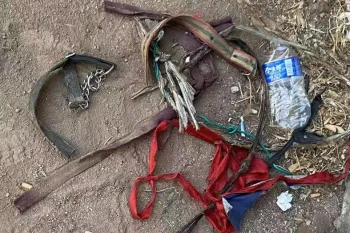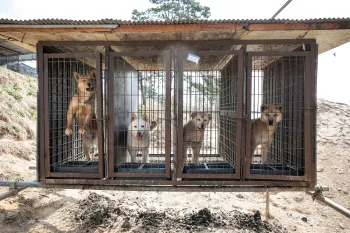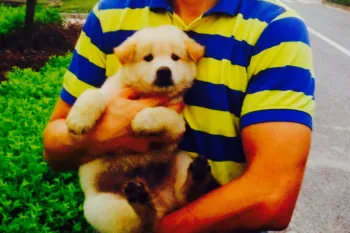The ‘Yulin Lychee and Dog Meat Festival’ is not an historical, cultural event. It was launched in 2010 by dog meat traders in the city of Yulin, in the Guangxi Zhuang Autonomous Region of China as a commercial venture to boost their dwindling dog meat sales. To create the illusion of tradition, they devised the idea of a "festival" starting on June 20/21 at the summer solstice.
The term “festival” is misleading; in truth there is very little about these few days in June that would be recognisable as festivities or celebration. Dogs and cats are killed for meat all year round in Yulin, so the “festival” is really just an escalation of what is an everyday trade in the city. Dog meat restaurants and food stalls are visible selling dog meat dishes, and larger-than -usual volumes of dogs and cats are trafficked into Yulin at this time for slaughter and sale.
Local officials initially endorsed the event, expecting it to attract Chinese tourists and boost local development. On the contrary, the festival has been a PR disaster for Yulin, earning national and international condemnation for the annual mass dog and cat slaughter, and the local authorities have disassociated themselves with from the event since 2014. Restaurants that once displayed visible signage boasting dog meat dishes have been removed and replaced with euphemistic language like "sweet meats". Day time public slaughter of dogs and cats is also now rare within the city centre. Most slaughter takes place in the early hours of the morning or in the outskirts of the city to avoid public and media attention.
At its height, as many as 10-15,000 dogs were killed for their meat in Yulin during this period, mostly trafficked into the city by trucks sourcing dogs from across China. More recently, as a direct result of national and global pressure, far fewer dogs and have been killed during the core days of 20-22 June, now estimated to be around 3,000-5,000 dogs over these days.
Human health risks of the dog meat trade
The dog meat trade poses a significant risk to human health via the capture, trade, slaughter and processing of dogs and their carcasses. The World Health Organization has warned of the role the dog meat trade plays in facilitating the spread of diseases such as cholera and the deadly rabies virus which kills around 30,000 people across Asia annually, given that it encourages the long distance trafficking of huge numbers of dogs of unknown disease and vaccination status.
In China, the dog meat trade breaches rabies control measures, undermining China’s efforts to eliminate this deadly disease. Historically, Guangxi province where Yulin is situated, was amongst China’s worst affected areas for human rabies, and Yulin was once among China’s 10 worst affected cities for human rabies cases. Although human rabies cases and deaths have decreased due largely to increased vaccination programs, dogs trafficked to Yulin come from as far as Anhui, Hubei, Henan, Hebei in Central and North China, more than 1,500 miles away, jeopardising local anti-rabies efforts.
Making progress in ending Yulin's dog and cat meat trade
The slaughter of thousands of dogs and cats at Yulin each year for the festival days remains a tragedy. However, it is important to remember that when the “festival” was launched in 2010, around 15,000 dogs were killed and diners would routinely be seen feasting in the streets. That all changed around 2014, when national and international outrage at the animal cruelty made global headlines and the Yulin authorities realised that endorsing the festival was a bad idea. They distanced themselves from the event, shut down one live dog market and closed many dog slaughter operations in the city’s urban center.
In 2015, officials ordered all Yulin restaurants to remove tables from outside their premises and, for the second year running, to reduce dog meat dishes. Big public displays of mass dog meat eating were forbidden in recognition that this was likely to lead to conflict and in 2016, they implemented road blocks to prevent trucks loaded with dogs and cats from entering the city. However they did so only a day or so prior to the festival, after most animals had already been offloaded at slaughterhouses in places outside the city center.
In 2017, the Yulin authorities announced to dog meat traders that a ban on the sale of dog meat would be imposed that year, with heavy fines. However, a few days later the ban was lifted after the dog meat traders threatened civil unrest. More recently, the number of dog carcasses being sold at Yulin has remained at the comparatively reduced estimate of 3,000-5,000.
Surveys of Yulin residents have consistently shown that most people in the city don’t regularly eat dog meat despite efforts by dog meat traders to promote it. In May 2025, Humane World for Animals' partner group Vshine again surveyed Yulin residents and revealed that 87.5% never or rarely eat dog or cat meat and 88% say a ban on the dog and cat meat trade would have no impact on their lives at all. Most of the dog meat stalls and shops previously scattered around the city have now been consolidated into Nanchao and Dongkou markets, probably to make it easier to monitor and manage.
As most people across China- including in Yulin- don't eat dogs and cats, the visibility of dog and cat carcasses for sale in this area of Yulin, particularly in May and June, is confronting and feels increasingly out of step with other parts of the country. In March 2020, the cities of Shenzhen and Zhuhai banned dog and cat meat. This legislative decision by two of mainland China’s most modern and progressive cities adds pressure on cities like Yulin that still allow the controversial trade. In April 2020, the Chinese national government (Ministry of Agriculture and Rural Affairs) made a public statement explicitly stating that dogs are considered companion animals and not “livestock”, referring to "the progress of human civilization and the public's concern and preference for animal protection."
These initial steps are commendable, but more proactive and decisive steps are needed to maintain this momentum. Together with our local partner Vshine, Humane World for Animals aims to do just that. If more cities across China declare bans on the dog and cat meat trade, cities like Yulin will be increasingly isolated in their tolerance of such cruel and risky behavior.
Get involved to make a change
Your voice matters because animals don’t have one. When you contact your representatives, sign a petition, attend an event or volunteer, you send the message that animal lovers everywhere want to end animal cruelty and create a more humane world. Find out ways you can take action for animals.
Meredith Lee/Humane World for Animals
%20smaller%20yulin.jpg819e.webp)


